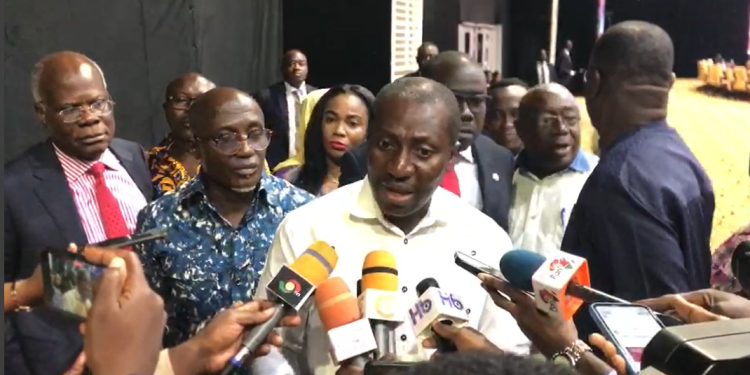In a recent press conference, Majority Leader Hon. Alexander Kwamena Afenyo-Markin expressed sharp criticism of the National Democratic Congress (NDC) following a contentious parliamentary session on October 17, 2024. His statements, made on October 18, reflect a rising tension between the NDC and the ruling New Patriotic Party (NPP), particularly regarding parliamentary proceedings. Afenyo-Markin’s remarks not only highlight the deteriorating relationship between the two parties but also convey his frustration with what he perceives as the NDC’s attempts to undermine the NPP’s authority within the Parliament. He notably accused the NDC of engaging in behavior he characterized as mischievous and malevolent, further intensifying the already charged political atmosphere.
Afenyo-Markin’s comments took a drastic turn when he labeled the NDC’s actions in Parliament as “evil,” indicating that he sees these actions as not just politically driven but also morally objectionable. This kind of strong rhetoric underscores the current state of discord in the legislative body, where both parties are maneuvering for dominance. The rising animosity reflects a broader struggle for power and influence that has characterized Ghanaian politics in recent years, and Afenyo-Markin’s remarks showcase the depth of this conflict. His language suggests that such disagreements are taking on more serious implications, moving beyond mere political rivalry to a battle over the moral integrity of political actions.
In light of the tensions, Afenyo-Markin defended the NPP’s decision to exit the parliamentary chamber during the turbulent session. He indicated that their departure was a calculated decision, made to uphold order during what he described as chaotic proceedings instigated by the NDC. By framing the NPP’s exit as a strategic move in the interest of decorum, he aimed to position his party as law-abiding and responsible while simultaneously blaming the NDC for the discord. This narrative of moral superiority aims to reinforce the NPP’s image as a party that prioritizes democratic principles, even in the face of provocation.
The Majority Leader’s assertion that the NPP would pursue their case through legal avenues further suggests a commitment to addressing grievances through established constitutional mechanisms. He expressed confidence that a judicial determination would ultimately reinforce democratic values and protect the integrity of legislative processes. This reliance on the courts aligns with a broader appeal to the rule of law, indicative of the NPP’s strategy to seek redress in a manner deemed honorable amidst political turbulence. Afenyo-Markin’s clarifications illustrate the NPP’s desire to maintain legitimacy while strategically navigating the contentious political landscape.
Afenyo-Markin’s remarks come at a time when parliamentary operations are increasingly fraught with conflict, often translating into public disputes and heightened scrutiny from constituents. The need for both parties to manage their reputations in the eyes of the public may be exacerbating confrontations, as each looks to position itself favorably in the political arena. The NDC, for its part, is likely to respond to Afenyo-Markin’s accusations, potentially deepening divisions and perpetuating a cycle of reciprocal blame that complicates the potential for constructive dialogue within Parliament.
In summary, Afenyo-Markin’s strong criticism of the NDC during a recent press conference illuminates the rising tensions within Ghana’s Parliament, showcasing the NPP’s frustrations over perceived NDC misconduct. The Majority Leader’s characterization of the NDC’s actions as morally and politically reprehensible reflects deeper concerns about the integrity of parliamentary proceedings amid escalating disputes. The NPP’s strategic withdrawal from the chamber signifies an attempt to maintain order and uphold democratic principles, as the party seeks legal redress to assert its position. The ongoing discord underscores a challenging environment for both major political parties, raising questions about their ability to engage constructively in the face of increasing hostility.














